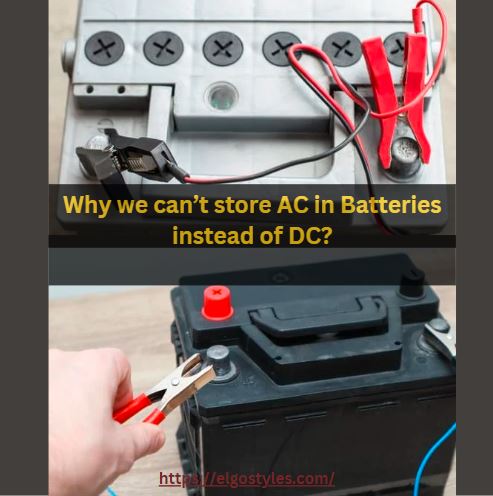Answer:
AC (alternating current) cannot be stored directly in batteries because batteries inherently store and supply energy in a direct current (DC) form. The conversion from AC to DC is necessary for effective energy storage.

Reasoning:
Battery Chemistry: Batteries operate on chemical reactions, inherently producing direct current (DC) electricity. Storing AC directly would require a different storage mechanism.
Energy Flow Consistency: DC offers a consistent unidirectional flow of energy, while AC continually changes direction, making it challenging to store in a conventional battery without conversion.
Efficiency: Converting AC to DC for storage is a well-established and efficient process, allowing for practical energy storage solutions.
FAQs:
Q: Why do batteries primarily store DC?
A: Batteries operate on chemical reactions that naturally generate direct current (DC), making it the default form for storage.
Q: Can AC be converted to DC for storage?
A: Yes, devices like rectifiers are commonly used to convert AC to DC for efficient storage in batteries.
Q: What happens if AC is directly applied to a battery?
A: Most batteries are designed for DC, applying AC directly can damage the battery and is ineffective for energy storage.
Q: Are there AC-based energy storage methods?
A: While not common in batteries, technologies like flywheels or supercapacitors can store energy in AC form.
Q: Why is DC preferred for battery-operated devices?
A: Many electronic devices operate on DC, and using DC batteries simplifies the power supply and enhances device compatibility.
Q: Does AC have advantages over DC in certain applications?
A: AC is advantageous for long-distance power transmission, but for energy storage in batteries, DC is more practical.
Q: Can renewable energy systems use AC storage directly?
A: Renewables often generate AC, but for storage in batteries, the AC is typically converted to DC for efficient energy storage.
Q: What is the role of inverters in AC to DC conversion?
A: Inverters convert AC to DC for charging batteries, and DC to AC when discharging, ensuring compatibility with different systems.
Q: Can battery chemistry be adapted for AC storage?
A: Battery chemistry is inherently DC-based due to the nature of electrochemical reactions, making AC storage impractical.
Q: Are there challenges in converting AC to DC for storage?
A: While conversion is common, it requires inverters, and there can be losses in the process; however, it remains the most practical solution.
 Electrical Engineering World Wiring a Brighter Tomorrow!
Electrical Engineering World Wiring a Brighter Tomorrow!